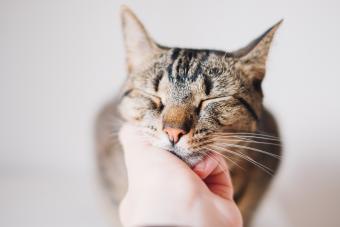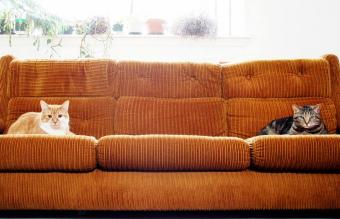
When there's a loss in the family, it's natural to reflect on the whole family and how you're reacting to that death. But do our cats do the same? You might be surprised to learn that how cats sense and react to death — and whether cats grieve — has been the subject of multiple professional debates.
Whil we can't ask cats directly, but by studying their behavior, we can form educated guesses about their capacity for grief and whether they miss their owners or other pets after they die. We can also look at how other cultures perceive cats, to get a sense for what other people believe. And, what we found may show that the feline experience of death and grief isn't far from our own.
Can Cats Sense Death?
Before we can ask whether cats grieve, it's important to ask whether they even understand death. In fact, many people believe cats may have a better ability to sense death than we do.
Students at Emory University investigated this question, and what they discovered is fascinating. Cat's eyesight and sense of smell are both significantly higher than our own. This means they can detect slight changes in our chemistry. So, that would lead us to believe they could sense when we're getting close to death, right?

The students believe cats can sense death due to their heightened senses, "Because cats rely primarily on body language to communicate to one another, they must be attuned to biological and behavioral changes in the other animals around them. This includes detecting weakness or changes in body temperature and odor."
Oscar the Cat Who Predicted Death
The case of Oscar the cat is well documented and often used to prove that cats have an acute ability to sense and understand death. Oscar lived in a nursing home and frequently climbed onto a patient's bed and kept them company while they passed away. He was known to visit the room the day before death, and was often used by staff so they can prepare themselves appropriately. Oscar the cat is credited with accurately predicting over 100 deaths until his own in 2022. Now, that's intriguing!
But Do Cats Actually Grieve Death?
When cats lose a loved family member, whether they're furry or human, many believe they grieve, and studies appear to back this up. Cats often have noticeable changes in their behavior following the loss of a loved one.
Signs of grief in cats can include:
- Visible depression
- A loss of appetite
- A lack of interest in play
- Increased vocalization
- Sleeping much more than usual
Some cats might show all of these behaviors, while others may only show one or two. Each cat's response to grief is unique, but the common thread is that they often don't seem like their usual selves. These behavioral shifts could prove the deep bonds cats form and how profoundly they can be affected by the loss of a companion.
Studies About Cat Grief
The Morris Animal Foundation conducted a research study to find out if cats grieve based on their behaviors. Each sign of grief was examined separately, ranging from their level of affection to their reaction to the deceased. The information was collected from 279 pet parents and their observations. The full discussion of the cat grief study, along with information regarding the research process, is available online.
The research study concluded that signs of grief are witnessed in cats for up to two months following the death of a loved one.
More Affection
97% of cats became more affectionate once their loved one passed away. Of these, 22% became increasingly needy. This involved being as close as possible to their surviving pet parent.
More Vocalization
Cats increased how much they vocalized after the loss of a companion. Not only did they do this more often, it was actually louder than it would have been otherwise. They returned to normal after about two months.
More Aggression Toward Other Animals
In research studies, aggression has been found to be one of the most obvious signs of stress in cats. So, it makes sense that when their loved one passes, they show increased levels of aggression toward other pets in the home. The factor that could not be controlled in the study is whether the aggression is due to fighting for social status, territorial behavior, or a reaction to their loved one's death.
Changing Territoriality
63% of cats in the study showed a change in their territorial behavior, with 50% of cats seeking out their loved one's favorite hangout areas. This behavior was found to resolve within about two months.

Veterinary Beliefs About Grief in Cats
According to Drs. Dani McVety and Mary Gardner with Lap of Love, a hospice organization for pets which of course sees a lot of cats dealing with loss, they believe that feline grief comes in three stages.
- Activation: During this stage, cats may wander or pace and will likely be more vocal than normal.
- Depression: Cats may not be interested in their normal activities.
- Acceptance: In the final stage, cats begin to accept their new way of living and become accustomed to a new routine.
Helping Your Cat Grieve
The veterinarians believe the grieving process could take anywhere from two weeks to six months. During this time, it could help to spend more time with your cat, offer them treats, and give them as much affection as possible.

If you notice anything concerning while your cat is grieving, reach out to your vet.
Skeptics Say Routine Changes, Not Grief
Even with the above studies, there are some skeptics who believe that cats don't actually grieve and argue that what we're noticing is a change in behavior based on the absence of someone in their lives. The belief is that they're not upset about their companion passing away but rather that cats are reacting to the fact that their routine has shifted. And, of course, cats can't explain to us why they're changing their behavior after losing a loved one.
While cats are known for liking a routine, believers in cat grief counter that a change in routine is, indeed, one of the things we humans grieve when someone passes as well.
Whether it's missing sharing everything with your bestie or cuddling into bed together at the same time each night, our own sense of loss of routine and a cat's sense of loss of routine might not be that different.
Religious and Cultural Beliefs
You've seen how Western societies view feline grief above. But what do other cultures think about it? Perhaps they can shed some insight.
Native American Philosophy
In many indigenous cultures, the relationship with nature and animals is deeply intertwined with their daily lives. The depth of their relationship is shown by animism, or the belief that animals have their own spirit and, therefore, their own complex emotions.
Ancient Egyptian Beliefs
Looking back at ancient civilizations, such as Egypt, cats were revered and often considered spiritual beings. The emotional states of cats might have been interpreted in the context of these spiritual beliefs. In such cultures, it's plausible that cats were believed to experience a range of emotions, potentially including sadness at the loss of a companion.
Hinduism Viewpoints
In Hinduism, the belief in non-violence and reincarnation leads to the view that animals, including cats, have emotions and are important parts of life's cycle. This perspective is not just about pets but sees all animals as emotionally complex beings. Hindu scriptures like the Bhagavad Gita emphasize the connectedness of all life, supporting the idea that animals can have deep emotional experiences.
Do Cats Miss Their Owners When They Die?
Different cultures have various ways of thinking about it, but many people around the world believe that cats have a unique ability to sense death and can feel a range of emotions. This includes possibly feeling sad or grieving when another pet or their person dies. This belief comes from a combination of traditional views, what we've seen in cat behavior, and recent scientific studies. Overall, understanding and supporting cats during this doesn't hurt, and if they do feel grief, we're helping them get through a difficult time. There's no harm in spending more time with your kitty. It could help you both.







